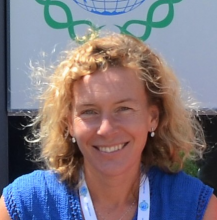
Group Leader
ICGEB
Serena Zacchigna was born in Trieste, Italy. Married, with two children.
She obtained her degree in Medicine in 2000 from the University of Trieste and her PhD in Molecular Genetics in 2005 from the International School of Advanced Studies in Trieste, Italy. In 2006 she was awarded a Marie-Curie post-doctoral research fellow in Peter Carmeliet Laboratory at VIB in Leuven (Belgium) to work on the neurovascular link.
In 2009 she returned to Trieste, where she first joined the Molecular Medicine Laboratory at the International Centre for Genetic Engineering and Biotechnology (ICGEB) and then established her own research group in 2015. At ICGEB she currently leads the Cardiovascular Biology Laboratory and acts as the Scientific Head of the Bioexperimentation Facility. She also represents the ICGEB at the UN Agency Committee for Bioethics, which serves as a key inter-agency mechanism for sharing information between intergovernmental organizations dealing with bioethical issues, with particular interest in the regulatory and ethical aspects governing the use of gene therapy, genome editing and cell therapy in the various countries. Since 2016 she joined the Medical Department of the University of Trieste.
Her research interests focus on the cross-talk between the various cell types residing in the heart during development and disease. In particular, she is dissecting the molecular mechanisms mediating the communication between endothelial cells and cardiomyocytes, with the ultimate goal of promoting effective neo-vascularization and cardiac regeneration following heart ischemia.
She has published over 65 full papers in peer-reviewed international journals, including Nature, Journal of Clinical Investigation, Journal of Neuroscience, Cell, Cancer Cell, Nature Genetics, Nature Medicine, American Journal of Pathology, Molecular Therapy, Circulation, Human Gene Therapy and others; 10 reviews or chapters in published books (h-index 32; sources: SCOPUS). Over the last years, she has been invited to present over 30 lectures on her research activity at several international meetings as well as seminars in Universities and Research Institutions in the United States, Europe, Japan and Australia.
Further information: https://www.icgeb.org/group-leader-serena-zacchigna.html
Selected Publications
1 Zacchigna, S. et al. Paracrine effect of regulatory T cells promotes cardiomyocyte proliferation during pregnancy and after myocardial infarction. Nature communications 9, 2432, doi:10.1038/s41467-018-04908-z (2018).
2 Rupel, K. et al. Photobiomodulation at Multiple Wavelengths Differentially Modulates Oxidative Stress In Vitro and In Vivo. Oxid Med Cell Longev 2018, 6510159, doi:10.1155/2018/6510159 (2018). 3 Montagna, C. et al. VSV-G-Enveloped Vesicles for Traceless Delivery of CRISPR-Cas9. Mol Ther Nucleic Acids 12, 453-462, doi:10.1016/j.omtn.2018.05.010 (2018).
4 Lesizza, P. et al. Single-Dose Intracardiac Injection of Pro-Regenerative MicroRNAs Improves Cardiac Function After Myocardial Infarction. Circ Res 120, 1298-1304, doi:10.1161/CIRCRESAHA.116.309589 (2017). 5 Bortolotti, F. et al. In Vivo Functional Selection Identifies Cardiotrophin-1 as a Cardiac Engraftment Factor for Mesenchymal Stromal Cells. Circulation 136, 1509-1524, doi:10.1161/CIRCULATIONAHA.117.029003 (2017).
6 Ruozi, G. et al. AAV-mediated in vivo functional selection of tissue-protective factors against ischaemia. Nature communications 6, 7388, doi:10.1038/ncomms8388 (2015). 7 Mano, M., Ippodrino, R., Zentilin, L., Zacchigna, S. & Giacca, M. Genome-wide RNAi screening identifies host restriction factors critical for in vivo AAV transduction. Proc Natl Acad Sci U S A 112, 11276-11281, doi:10.1073/pnas.1503607112 (2015).
8 Giacca, M. & Zacchigna, S. Harnessing the microRNA pathway for cardiac regeneration. Journal of molecular and cellular cardiology 89, 68-74, doi:10.1016/j.yjmcc.2015.09.017 (2015). 9 Zacchigna, S., Zentilin, L. & Giacca, M. Adeno-associated virus vectors as therapeutic and investigational tools in the cardiovascular system. Circ Res 114, 1827-1846, doi:10.1161/CIRCRESAHA.114.302331 (2014).
10 Zacchigna, S. & Giacca, M. Extra- and intracellular factors regulating cardiomyocyte proliferation in postnatal life. Cardiovasc Res 102, 312-320, doi:10.1093/cvr/cvu057 (2014). 11 Puente, B. N. et al. The oxygen-rich postnatal environment induces cardiomyocyte cell-cycle arrest through DNA damage response. Cell 157, 565-579, doi:10.1016/j.cell.2014.03.032 (2014).
12 Eulalio, A. et al. Functional screening identifies miRNAs inducing cardiac regeneration. Nature, doi:10.1038/nature11739 nature11739 [pii] (2012).
13 Van de Veire, S. et al. Further pharmacological and genetic evidence for the efficacy of PlGF inhibition in cancer and eye disease. Cell 141, 178-190, doi:S0092-8674(10)00192-3 [pii] 10.1016/j.cell.2010.02.039 (2010).
14 Zacchigna, S. et al. Loss of the Cholesterol-Binding Protein Prominin-1/CD133 Causes Disk Dysmorphogenesis and Photoreceptor Degeneration. J Neurosci 29, 2297-2308, doi:29/7/2297 [pii] 10.1523/JNEUROSCI.2034-08.2009 (2009).
15 Zacchigna, S. et al. Bone marrow cells recruited through the neuropilin-1 receptor promote arterial formation at the sites of adult neoangiogenesis in mice. J Clin Invest 118, 2062-2075 (2008). 16 Zacchigna, S., Lambrechts, D. & Carmeliet, P. Neurovascular signalling defects in neurodegeneration. Nat Rev Neurosci 9, 169-181 (2008).
17 Wei, C. et al. Modification of kidney barrier function by the urokinase receptor. Nat Med 14, 55-63 (2008).
18 Aragones, J. et al. Deficiency or inhibition of oxygen sensor Phd1 induces hypoxia tolerance by reprogramming basal metabolism. Nat Genet 40, 170-180 (2008).



